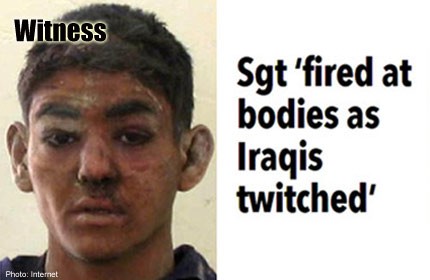British sergeant denies firing at bodies in Iraq

LONDON - A former British army sergeant denied on Monday he had fired at bodies on the ground in a fit of anger during a battle in Iraq in 2004 and said he had opened fire because an Iraqi insurgent was about to shoot at him.
Paul Kelly was testifying at the Al-Sweady Public Inquiry in London, which is investigating allegations by Iraqis that British troops committed atrocities at or after the battle of Danny Boy near Majar al-Kabir in southern Iraq on May 14, 2004.
The allegations include that the soldiers captured some Iraqis alive and executed them at their camp, that they mutilated bodies, and that they tortured detainees. Most of the soldiers deny that any of this happened.
A former private in Kelly's platoon at the time, Duncan Aston, alleged at the inquiry last week that he had seen Kelly spray bullets with an automatic rifle at six Iraqi bodies lying in a ditch, two of which were twitching.
Kelly's own evidence was that there were six or seven bodies lying or crumpled in the ditch but also two standing men, one of whom turned towards him raising an AK-47 rifle to fire.
"What I'm saying is I walked into a trench and somebody pointed a weapon at me and I started firing," Kelly said.
"Whether I hit people on the ground I don't know, but I swept up in a motion and it's possible I hit people on the ground," he said, disputing that Aston was present.
The inquiry took evidence from 60 Iraqi witnesses between March and June and started hearing British military witnesses last week. A final report is expected in late 2014.
The inquiry has no power to prosecute but, depending on its conclusions, military prosecutors could decide to bring charges.
Kelly, who was awarded the Military Cross medal for his conduct during an earlier firefight in Iraq in which he was wounded, left the army in 2006 having become disillusioned.
He rejected a specific allegation by Aston, who said he saw three fellow privates beat an Iraqi detainee in a derelict building during the battle.
"My guys were professional. That's why. When they were on the ground they did exactly as they were supposed to. I just cannot imagine that sort of stuff going on," he said, adding that he had rejected all the Iraqi allegations out of hand.
The Iraqi bodies were handed back to local people outside Camp Abu Naji the day after the battle and it was from that moment that allegations of executions and mutilations surfaced.
British troops were part of the US-led force which invaded Iraq in 2003 to oust Saddam Hussein. Based mainly in the southern city of Basra, they began pulling out in 2009, with the last leaving in 2011. A total of 179 British personnel were killed over the eight years.